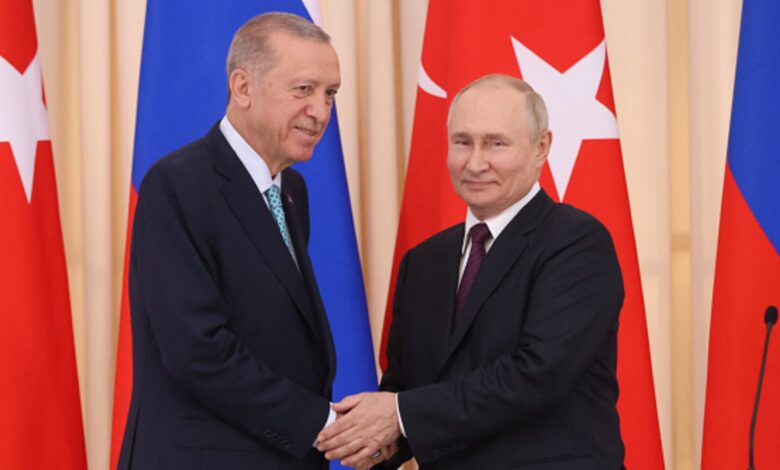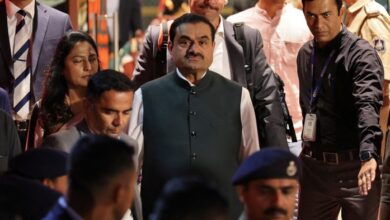Türkiye’s bid to join BRICS is both strategic and symbolic, analysts say

Turkish Foreign Minister Hakan Fidan attends a BRICS+ session during the two-day BRICS foreign ministers’ summit held in Nizhny Novgorod, Russia on June 11, 2024.
Sefa Karacan | Anadolu | Getty Images
Türkiye’s request to join the BRICS alliance is seen as a strategic and symbolic move as the Eurasian nation of 85 million people increasingly gains influence and leverage on the international stage.
“Our president has repeatedly expressed that we want to become a member of BRICS,” a spokesman for Turkey’s leading AK Party told journalists in early September. “Our demands in this regard are very clear and the process is underway within this framework.”
BRICS, which stands for Brazil, Russia, India, China and South Africa, is a group of emerging market nations looking to strengthen their economic ties. This year, the group added four new members: Iran, Egypt, Ethiopia and the UAE.
It is also seen as a counterweight to Western-led organizations such as the EU, G7 and even NATO, although it lacks formal structures, enforcement mechanisms and unified rules and standards.

For Türkiye, a longtime Western ally and NATO member since 1952, the move to join BRICS “fits into its broader geopolitical journey: to position itself as an independent player in a multipolar world and even become a pole of power in its own right,” George Dyson, a senior analyst at Control Risks, told CNBC.
“This doesn’t mean Türkiye is turning its back on the West completely,” Dyson added, “but Turkey wants to foster as many trade relationships as possible and pursue opportunities unilaterally without being bound by Western alignment. This is certainly symbolic because Turkey is demonstrating exactly that—that it is not bound by good relations with the West.”
Diversify your alliances
Despite decades of ties with Europe and the United States, Türkiye has been repeatedly denied EU membership, something that has long been a sore point for Ankara.
Ambassador Matthew Bryza, a former senior White House and State Department official now based in Istanbul, said Turkish President Recep Tayyip Erdogan and his government “appear to be driven primarily by two factors: A strategic tradition of protecting national interests… and a desire to scare the West a little, both out of anger and as a negotiating tactic to win concessions.”
CNBC has reached out to the Turkish president’s office for comment.
Türkiye has in recent years expand its role in global diplomacy, brokered prisoner swap deals and led other negotiations between Ukraine and Russia, for example, while also mending previously strained relations with regional powers such as Saudi Arabia, the United Arab Emirates and, most recently, Egypt.
Russian President Vladimir Putin shakes hands with Turkish President Recep Tayyip Erdogan during a joint press conference on September 4, 2023, in Sochi, Russia.
News Getty Images | Getty Images
Ankara also refuses to join sanctions against Russia — a stance that irks its Western allies but helps it maintain its independence. the so-called “middle power”, which they see as beneficial to relations with China and the Global South.
To that end, “any new member of BRICS would clearly want to take advantage of the stronger ‘unity’ of emerging economies to reduce dependence on developed economies, primarily the United States,” said Arda Tunca, an independent economist and consultant based in Turkey.
Stand up against the West?
However, Tunca noted that Türkiye’s unique position in the world is a “delicate point of discussion” as the country has “serious political problems with the EU and the United States” despite its alliance with the West.
Türkiye’s ruling party, which has run the country for 22 years, is “ideologically closer to the East than the West,” Tunca said. “Turkey wants to jump on the BRICS train before it’s too late. It’s too early to say that BRICS can become an alternative to the West, but the intention is clearly to stand up to the West under the leadership of China.”
Importantly, being part of BRICS allows members of the bloc to trade in currencies other than the dollar. This is intended to reduce dependence on the US-led system and usher in a more multipolar world. The fact that the system is led by China has alarmed some in the West, who see it as a potential win for Beijing.
Turkish President Recep Tayyip Erdogan (not shown) is welcomed by Chinese President Xi Jinping at the 11th G20 Leaders’ Summit in Hangzhou, China, on September 3, 2016.
Mehmet Ali Ozcan | Anadolu Agency | Getty Images
“I don’t think there’s any enforcement by them. [BRICS’] “It’s more geopolitical, like a symbolic protest against the G7,” Dyson said. “It’s interesting that Iran and the UAE are both involved. It’s like an anti-Western group,” he noted.
Erdogan has spoken of his desire to join BRICS since at least 2018, but the matter has never been formalized. In June, Turkish Foreign Minister Hakan Fidan visited both China and Russia, followed by a BRICS+ summit, where Russian President Vladimir Putin said he “welcomed” Turkey’s interest in joining the bloc.
At the time, the US ambassador to Türkiye, Jeff Flake, said in an interview that He hopes Türkiye will not join the group, but added that he did not think it would negatively affect Türkiye’s ties with the West.




